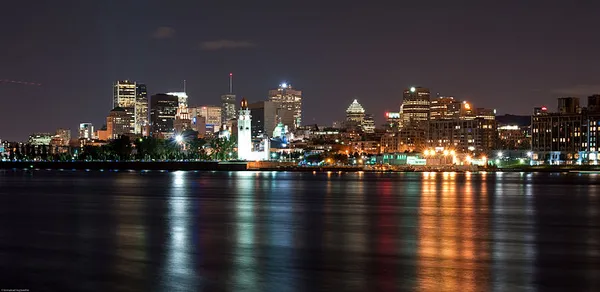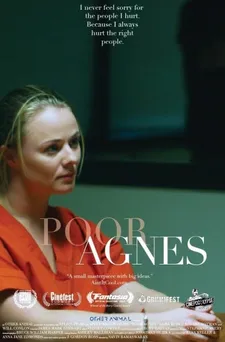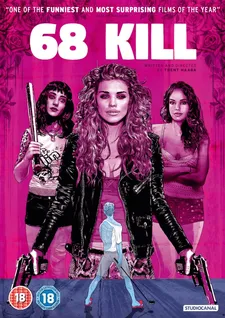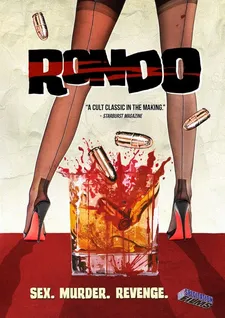 |
| Montreal, home of Fantasia Photo: Emmanuel Huybrechts (licensed under Creative Commons 2) |
Thanks to the Covid-19 pandemic, 2020 has been a tough year for everyone. It has seen a huge number of cultural events cancelled around the globe and has forced film festival teams to make difficult decisions. One of those affected was Fantasia, a leading genre film festival based in Montreal which is the highlight of the year for many of its loyal fans. Festival director Mitch Davis told us how difficult it was for his team to come to terms with the enormity of the situation, how they came to the conclusion that it might have to be cancelled and how, in the end, they found a solution.
 |
| "We were were really well received and made welcome by everyone" - Lora Burke on Poor Agnes screening at Fantasia |
"It took us some time to come around to it," he explains. "At first, we postponed to late August, hoping that things might become in some way do-able by then, which now feels positively naive. At that time, the city had been planning to reopen things in June. I supposed they still might, in some way. Within days of our announcing the postponement, Quebec issued a ban on large festivals and cultural events until August 31.
"We very briefly thought about potentially moving to the end of the fall, but the more we thought about what a physical festival would be like with social distancing measures in effect, as would surely need to be the case, it just felt like it would be the most unpleasant and miserable experience for everyone. Imagine, to enforce 6-foot distancing, each member of the audience would need to have at least five empty seats on either end of them, with at least two empty rows in front and behind them. How horrible an experience would that be? Just imagining our poor venue staff and volunteer teams frequently being stuck having to ask people to move even further away from their friends, hour after hour, day in, day out made me worried beyond words. It wouldn’t be fun for anyone.
"Beyond that, most importantly, if there was still any kind of community spread happening with the virus, which there almost surely will be in the fall, it now seems, it just wouldn’t be ethical to ask anyone to come to the cinema, or to offer an array of cool things that might push people to make potentially reckless choices because of some FOMO vibe that we’ve built up. And then, on top of all that, international guests would still surely be a no-go in the fall. Basically, everything that we love about film festivals would be muted or inverted into negative shadows of what they represent to us if we moved forward with a physical festival in 2020, and it broke our hearts to come to accepting that."
Running the festival in a non-physical way was not, however, a step that seemed viable.
 |
| "It was so much fun. We had a really good time" - Jenn Wexler on The Ranger screening at Fantasia |
"An online festival initially felt unthinkable to us. The most rewarding aspect of programming is getting to watch a film you’ve been taken by come to life in front of an audience - and in front of the filmmaker, whose life sometimes changes in real time. Seeing filmmakers return to the stage for a Q&A with entirely different body language than they had when they did their intro before the screening is the most wonderful thing. And our audience is so, so amazing. They’re a huge part of what makes the festival the experience that it is. Doing something virtual at first felt so wrong to me, and it seemed like such an anti-climactic way for a filmmaker to launch a new work."
I've spoken to filmmakers who have told me that Fantasia screenings were the moment when they knew they'd made it, so know that this is no exaggeration. It's a festival that makes room for a lot of first-timers and it means the world to them.
"Of course, in today’s circumstances, our choices were to either do some kind of virtual fest or cancel our 2020 edition outright," Mitch continues, "which would mean abandoning so many standout films we’ve fallen in love with over the course of this year’s programming digs. Given those choices, the former was clearly the better option, especially because it would also give us a way to still be there for our audience during such sad and scary times, when just about everything is cancelling across the summer. But before we committed ourselves to it, we looked into how far we could realistically push the model of a virtual fest,
"Speaking with the Festival Scope people is what finally made us begin to feel a lot better about what could be done. I suggested real-time, pay-per-view-like live screenings for our World and International premieres that could allow for the filmmakers to do intros and Q&A’s and they were super enthusiastic about going that route. This way, the filmmakers can still be a part of their launch, they get to communicate directly with their audience immediately after their screening, and the audience still has some semblance of a shared experience together. It’s no replacement at all for the real thing, but it’s something, and it can be pretty cool. To protect the films, we're going to sell limited numbers of tickets per screening, comparable to physical cinema capacities, and we’ll be geofencing everything to Canada. When Festival Scope and Shift 72 said they could do all this for us, we were in like Flint!"
 |
| "There's nothing better than playing in front of a few hundred genre fans" - Travis Stevens on 68 Kill |
I ask if they're aiming to provide spaces where viewers can discuss the films as they usually would at the festival.
"We really want to. It’s a nut we haven’t quite cracked yet, but we’re looking at different options. It’s so important for a meaningful festival experience."
Genre films are often made for love, with very little money involved. Is this move an important means of ensuring that people don't go broke because the films they've invested in are invisible?
"That’s definitely a part of it," he replies. "So many of the smaller left field Indies that we love to champion run a risk of falling between the cracks in a good year. Now, with so many fests cancelling, many of the 2021 lineups are going to be that much more difficult to break into and it’s going to be so hard for much of the current crop to find proper sales and distribution. That said, selling any film in today’s climate is infinitely more difficult than it was just several months ago. Most distributors I’m talking to are mainly not taking chances until market sands stop shifting a bit. On our end, we’re going to do what we can to help the films we showcase. Every feature’s going to be getting an MG vs a percentage of their virtual box office."
Does he expect to reach the same audience as usual or does he think that the new format - and the fact that a lot of people are stuck at home with not much to do - will prompt new people to give the festival a try?
"I guess we’ll have a mix of our regular Fantasia Family and curious newbies on the other side of the country who’ve never travelled in but have always had some kind of interest in what we’ve been doing," he says. "It’s going to be such a different experience as a virtual event that it’s hard to predict whether the normal energy and intensive engagement that happens organically at our physical fest editions can carry over in some way to maintain two weeks of programming in the digital world. Hopefully people won’t be as stuck inside come late August as they are now, and I suppose that could impact attendance too, but we’ll see. And I have no idea if people will overall be cool with the thought of real-time screenings that will start without them if they tune in late. In cinemas, it’s a given, but at home, we’ve all become so accustomed to watching whatever interests us at the times of our choosing, it could certainly annoy some people. It’s a risk we’re willing to take to keep a live energy and have the filmmakers be a part of their screenings."
 |
| "At Fantasia I felt we had the perfect audience" - Rondo director Drew Barnhardt |
Has lockdown affected the way that he has been sourcing films, communicating with filmmakers are preparing for the festival?
"It has, in so many strange ways. I can’t speak for the other programmers, but on my end, there was a period of several weeks where I just wasn’t able to be receptive to films in the ways I normally would be. For one, there was an uncanny sense of everything feeling dated, with even the most recently completed works no longer addressing the experiences of contemporary life. Any moments of physical proximity - shots with flirtatious characters or friends gathered closely around a table, for instance - had tinges of recklessness and threat. But what was really doing my head in was the pervasive sense that everyone I was looking at onscreen was now in immediate, mortal danger. I would get sudden waves of panic and grief when I was watching anything, and I had to step away for a little bit. This was at a period where projections were showing that Canada, the US and the UK were likely a week or two away from being as devastated as Italy had been, when pleas for social distancing had just begun. It was so disturbing. And two weeks earlier, I’d been in Berlin where I’d been at multiple tightly packed screenings , restaurants and bars every day, all of which now seems so unbelievably risky.
"Of course, cut to today, early May, we’ve all grown somewhat accustomed to this temporary new normal, but I do find myself regularly thinking about how films I’m ready to invite could play with a heightened significance to an audience experiencing months of relative isolation, so films that address the limits of intimacy through technology, for example, become so much more resonant and immediate. Of course, it’s difficult not to think of how the more overtly crowd-pleasing films we’re going to show - the films that would play like rock concerts at any edition of our physical fest - might play with a very different energy in a subdued home environment, but there’s nothing we can do about that. Our curation will be addressing the climate and concerns of the day, but it won’t be wholly altered by them. Communicating with filmmakers, sales agents and distribs has been an especially fantastic experience these past weeks as just about everyone is so happy that we’re still doing the festival, and people are enthusiastic about the way we’re approaching it, thankfully. I expected a number of them to politely bow out when it came to the idea of making their films available in an online form for any amount of time, but just about everyone has so far embraced it. None of us would have considered this kind of thing just two months ago, yet here we are."





















